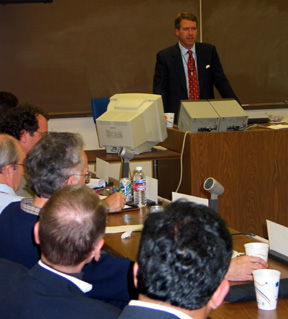James B. Milliken, J.D., stood near the doorway, greeting each person as they entered the room for the 5 p.m. UNMC Faculty Senate meeting.
“Hey don’t go away,” said the new University of Nebraska president, as UNMC’s Robert Binhammer, Ph.D., nearly slid past him. “I’m J.B. Milliken,” he said, extending his hand.
On Monday, the new University of Nebraska president shook hands and greeted familiar faces by name during a speaking engagement at UNMC Faculty Senate meeting.
 “It’s important for the board to understand the complexity and different challenges on each campus,” he told the group.
“It’s important for the board to understand the complexity and different challenges on each campus,” he told the group.
During a 45-minute discussion, Milliken, who assumed his new post Aug. 1, shared his core beliefs about higher education, from the purpose of public universities to the importance of quality faculty and strong research programs.
Public universities were established to serve the state, or in Nebraska’s case, its 1.7 million residents and 93 counties, Milliken said. “The University of Nebraska exists primarily in three locations, but that does not absolve us of the duty to serve the entire state,” he said. “The medical center has been a leader in serving the entire state.”
One of the most fundamental obligations of a university is to provide affordable access, he said. “We have some real challenges in Nebraska,” he said. “Nebraska has a college going rate that is about the national level, but educates its adults below the national average.”
To bolster the state’s future, it’s important to diversify the student and faculty ranks, as well as attract more out-of-state students, he said. “Bringing more smart people into Nebraska is good strategy for the future,” he said. Plus, studies indicate that students who attend school in Nebraska are more likely to stay after graduating, than those who leave for their education.
He praised the Virginia-Nebraska Alliance, a unique partnership spearheaded by UNMC, which connects five Historically Black Colleges and Universities and a leading Virginia community college with UNMC and Virginia Commonwealth University to provide academic and research opportunities for minority undergraduate students and faculty.
Milliken also emphasized the need to invest, attract and retain quality faculty members. To aid in that effort, the NU Board of Regents recently endorsed a proposal to develop a matching program for distinguished faculty chairs with private money, he said.
The Board of Regents also recently endorsed a $140 million plan to seek state funding to upgrade 12 buildings on NU’s four campuses, including the UNMC Eppley Cancer Center ($4.1 million), the College of Dentistry building in Lincoln ($7.7 million), and Poynter, Bennett and Wittson Halls ($20.2 million).
A strong research program “attracts quality students and faculty and is great for the state of Nebraska,” Milliken said, noting the university has made “dramatic strides” in recent years. “The medical center has shown remarkable success with its research agenda and has done a good job of having a strategic focus,” he said.
Making choices and setting priorities is necessary, Milliken said, noting he appreciates the attitude shown by a medical center colleague who said, “we can’t be great at everything, but we can be great at anything.”
Milliken’s philosophical beliefs also include enhancing the tradition of engagement, also known as service or outreach. Universities must engage in new and different ways with people across the state,” he said. “That’s incredibly important.”